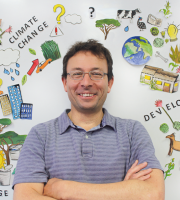Climate Change
Extreme Weather Events
Terrestrial Biodiversity
Climate Adaptation & Resilience
Droughts & Heatwaves
Ecosystem Services
Water Scarcity
AXA Chairs
South Africa
2016.12.31
Actionable Research on Climate Change Risks in Africa
Africa is already facing loss and damage from human-caused climate change and is among the regions most vulnerable to future climate change. However, Africa is also an important arena for more transformative, rapid, and equitable solutions to the climate crisis.
As the holder of the AXA Research Chair in African Climate Risk, Associate Professor Christopher Trisos, is working with his team at the Climate Risk Lab and the African Synthesis Centre for Climate Change, Environment and Development (ASCEND) to develop actionable research on climate change risks. Their focus is building tools that predict where and when climate change risks appear and how society can adapt to reduce these risks.
Attributing and Predicting Climate Change Impacts
Climate science has advanced rapidly in recent years to be able to attribute certain extreme weather and climate events (e.g., heavy rainfall, drought or heatwaves) to human-caused climate change. However, much work remains to be done to take the next step to attributing the impacts (e.g., lives lost or economic damage suffered). Focusing on biodiversity and infectious disease, the Climate Risk Lab aims to develop impact attribution analyses for a range of ecosystems and human health outcomes, such as changes malaria incidence due to climate change. The next step will be using these relationships between impacts and climate change to predict impacts 5 and 10 years into the future.
Climate change literacy and education
Compared to health, food, and biodiversity, climate change risks to education have received very little attention and there has been almost no focus on climate change risks to sport. Research work in education is focused on estimating the impacts on education outcomes due to climate change, such as fewer years of schooling completed due to damage to education infrastructure from extreme events. It is also focused on broadening climate change communication in Africa beyond English and French, in collaboration with African science communicators. Research on sport is focused on building a community of practice to better understand and adapt to climate change risks to professional and amateur sports. Climate change hazards such as extreme heat and flooding present potentially major risks to outdoor sports such as football that are important for recreation and culture and support multi-billion dollar industries.
Synthesis for making important choices wisely
Many sectors in Africa are relatively rich in data, but support for data integration and synthesis on climate change risks is lacking. This lack of synthesis holds back more evidence-based policy on climate change. The AXA Research Chair supports my role as Director of ASCEND which provides specialised infrastructure for enabling collaborative teamwork across research, policy, and practice that integrates diverse data and knowledge, and accelerates solutions-oriented research for enhancing action on climate change and development across Africa and globally. ASCEND is the first synthesis research centre specifically focused on climate change.
This is the second mandate of the AXA Chair on African Climate Risk, previously held by Prof Mark New with the project below:
Understanding, Reducing and Managing African Climate Risk
Damaging weather and climate events are felt the world over, but the lower capability to deal with these makes African countries among the most vulnerable to climate change. Moreover, coping strategies must also evolve as the severity and distribution of these hazards change. As the first holder of the successional AXA Research Chair in African Climate Risk, Professor Mark New, Director of the African Climate and Development Initiative (ACDI) at the University of Cape Town, worked with his team to quantify some of these changing risks and their societal consequences.
Attributable change in climate risk
Drought is a pressing issue in southern Africa—one need only think back to Cape Town’s 2018 water crisis to be reminded of the stakes. A major focus of Prof. New’s work has been defining the contribution of human activity to such damaging events in southern Africa, and how that “attributable change” in climate then affects water security. Prof. New compared the simulated drought severity with and without human influence on climate and observed how the attributable change in climate risk propagates through to impacts on the ground.
Taking the Cape Town droughts as a case study, Prof. New showed that a three-fold attributable increase in the likelihood of the rainfall drought translated into a four-fold increase in risk of hydrological drought, which is the change in river flows. While it takes some time for theory to trickle down into practice, these findings could inform the design of more resilient water resource systems.
In related modeling work, Prof. New’s team found that the removal of the alien vegetation that siphons water from precious mountain catchments would help ease drought but would not totally offset the water security risk—already, the impact of climate change is too large for this to be a comprehensive adaptation measure.
Sovereign drought insurance
Drought’s dire consequences for food security are especially felt by vulnerable populations and will be compounded by a growing population and more frequent climate events. Working with the African Risk Capacity, Prof. New has applied his attribution methodology to their risk model of food insecurity. According to this work, climate change has increased the underwriting costs of insurance—in Zimbabwe and Malawi, the insurance cost has increased by nearly 50% compared to a world with no climate change. The use of historical data to drive these insurance risk models is also suboptimal, and existing methods need to be updated to more faithfully gauge the risks that insurers are insuring against.
Partnerships to support change
Furthering climate change research in Africa requires trust and collaboration. Prof. New has managed to incorporate some of his climate change attribution work into the African chapter of the Principles for Sustainable Insurance, a collection of insurance issuers. The climate attribution work has also been included in the 2022 Intergovernmental Panel on Climate Change Report. The ACDI has contributed more to the IPCC than any lab worldwide. Creating research capability in Africa through initiatives like an AXA Chair, says Prof. New, has strengthened the African voice in these international processes.
Another development during Prof. New’s 5-year Chair has been the creation of the ARUA Centre of Excellence in Climate and Development, which is an alliance between the Universities of Cape Town, Nairobi, and Ghana. As well as being a staunch supporter of research agendas that make sense for southern Africa, Prof. New has nurtured the development of MSc and Ph.D. students and mid-career researchers—the future experts in African climate risk.
Moving forward, together
The ACDI adopts a transdisciplinary approach, where societal actors, such as resilience managers in the city of Cape Town or the local Department of Water Affairs, are consulted on an ongoing basis. In this way, Prof. New hopes to transform awareness into action. However, there are challenges yet to overcome—many African countries have scarce or non-existent climate observation networks and find it difficult to update systems given the inadequacy of resources.
Prof. New hopes to probe the issue of climate-health relationships in Africa with Professor Lara Dugas, a new AXA Research Chair in Health at UCT. They will investigate whether climate change signals can be detected within longitudinal human health data, as well as the effects of climate on nutritional status and the implications for food security management. Prof. New hopes that the future Chairs will move from risk diagnosis to risk responses, such as finding solutions to the ever-present food security concern.
October 2022
Find Out More About Mark New
An interview with Prof. Mark NEW: Quantifying and Understanding the Changing Risk of Climate on Water and Food Security in Southern Africa
ReadRelated articles
Climate Change
Finance, Investment & Risk Management
Societal Challenges
Climate Adaptation & Resilience
Insurance & Risk Management
Environmental Justice
Civil Society & Governance
AXA Project
Italy
AXA Research Lab on Climate Change, Risk and Justice
In response to three research questions: How can the private and financial sectors contribute to a just transition to a... Read more

Gianfranco
PELLEGRINO




